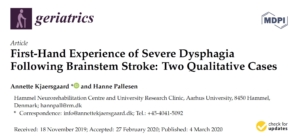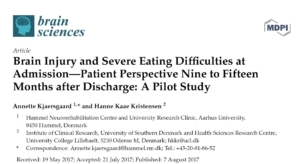ABSTRACT
Her kommer den engelske abstract som jeg fik accepteret til verdenskonferencen i Rehabilitering, som skulle have været afviklet i 2020, men som pga. Corona blev udsat til 7. til 9. September 2021.
First-hand experience of severe dysphagia following brainstem stroke: two case reports
Annette Kjaersgaard, PhD, Occupational Therapist¹, Hanne Pallesen, PhD, Physiotherapist¹, ¹Hammel Neurorehabilitation Centre and University Research Clinic, Aarhus University, Denmark
Background: Dysphagia has profound effects on individuals, and living with dysphagia is a complex phenomenon that touches essential areas of life. Dysphagia following a brainstem stroke is often more severe and the chances of spontaneous recovery are less likely as compared with dysphagia following a hemispheric stroke.
Purpose: To explore how two individuals with brainstem stroke experienced severe dysphagia during their inpatient neurorehabilitation and how they had recovered approximately one month following discharge.
Method and content: An explorative study was conducted to evaluate the first-hand perspective on severe eating difficulties. A qualitative case study was chosen to collect data during two face-to-face semi-structured interviews. Phenomenological perspectives shaped the interview-process and the processing of data.
Perspectives: Analysis of the empirical data generated the following main themes regarding experiences of: i) the mouth and throat; ii) shared dining; and iii) recovery and regression related to swallowing-eating-drinking. Participants expressed altered sensations of the mouth and throat, which affected their oral intake and social participation in meals. Good support for managing and adapting their problems of swallowing, eating, and drinking in daily activities is essential. Knowledge and capabilities of professionals in relation to dysphagia is a significant requirement for recovery progress.
Keywords: Neurorehabilitation, Qualitative interview, Phenomenological design, Deglutition disorder
Data fra den kvalitative del af min PhD er bl.a. publiceret i to artikler (2020, 2017). Det er resultaterne fra den sidste artikler fra 2020, som præsenteres på konferencen.
2020

Klik på disse linjer og du får adgang til fuldtekst artikel fra 2020, som er i open access dvs. du kan hente den uden at skulle betale
2017

Klik på disse linjer og du får adgang til fuldtekst artiklen fra 2017, som også kan hentes gratis

